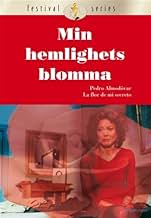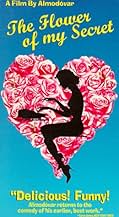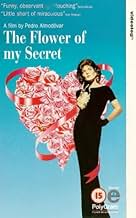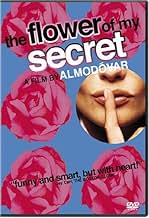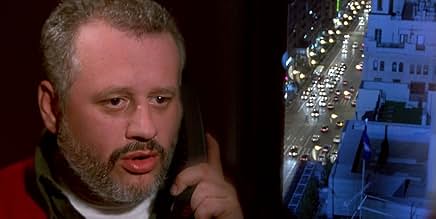IMDb-BEWERTUNG
7,0/10
13.407
IHRE BEWERTUNG
Ein Pseudonym, aber als sie mit ihrer Beziehung zu ihrem Mann zu kämpfen hat, wird ihr Output immer düsterer.Ein Pseudonym, aber als sie mit ihrer Beziehung zu ihrem Mann zu kämpfen hat, wird ihr Output immer düsterer.Ein Pseudonym, aber als sie mit ihrer Beziehung zu ihrem Mann zu kämpfen hat, wird ihr Output immer düsterer.
- Regie
- Drehbuch
- Hauptbesetzung
- Auszeichnungen
- 5 Gewinne & 13 Nominierungen insgesamt
Kiti Mánver
- Manuela
- (as Kiti Manver)
Empfohlene Bewertungen
Sweet, and very well acted. This is much less wild and outrageous than earlier Almodovar, but compensates by having more real emotion. Still, this has two of his usual key elements -- dramatic use of intense color, and a melodramatic, almost soapy, story. It's clear he loves melodrama at the same time he gently pokes fun at it.
But in 'Flower of My Secret' the soap has more underpinnings in humanity, with subtler behavior and humor. Technically he gets even better with this film. It's beautiful, shot in a more subdued style than his earlier work. Not a great movie, but a good, entertaining, human one that paves the way to his later fully 'real' and moving masterpieces like 'Talk to Her'. Lovely performances.
There seem to be two distinct groups among Almodovar fans. Those who prefer his earlier, wilder, more genre busting work, and those who prefer his more recent, subtler films. I'm in the second group, but can completely understand those who feel differently. And where you fall on that scale is likely to have a big impact on your reaction to this film.
But in 'Flower of My Secret' the soap has more underpinnings in humanity, with subtler behavior and humor. Technically he gets even better with this film. It's beautiful, shot in a more subdued style than his earlier work. Not a great movie, but a good, entertaining, human one that paves the way to his later fully 'real' and moving masterpieces like 'Talk to Her'. Lovely performances.
There seem to be two distinct groups among Almodovar fans. Those who prefer his earlier, wilder, more genre busting work, and those who prefer his more recent, subtler films. I'm in the second group, but can completely understand those who feel differently. And where you fall on that scale is likely to have a big impact on your reaction to this film.
Only Pedro Almodovar can do a melodrama that crosses genres like this film. In one sense, this is a film that you would expect to see on Lifetime.
Marisa Paredes (All About My Mother, Life is Beautiful) is nothing less than outstanding a a writer that is going through a crisis with a husband (Imanol Arias) that does not love her anymore. There is, of course, a crisis with her mother (Chus Lampreave - Volver) at the same time. Then, she finds out that it is her best friend that is having an affair with her husband, and there are profession problems at the same time. Sounds just like a Lifetime movie, doesn't it? But, Almodovar manages to give us a great story with his twists. Laughs are generous as comedic situations occur throughout. It's like wanting to laugh at something at a funeral. It happens, and we just have to deal with it.
Juan Echanove (who supposedly gave a great performance in Alatriste, the film that I have been waiting for release theatrically, or on DVD) is superb as Ángel, the newspaper editor who fulfills a dream to write romance novels. and who is in love with Leo (Parades).
It is just another great film from Almodovar that defies a description that would ever do it justice. Only experiencing his films can ever be pleasure.
Marisa Paredes (All About My Mother, Life is Beautiful) is nothing less than outstanding a a writer that is going through a crisis with a husband (Imanol Arias) that does not love her anymore. There is, of course, a crisis with her mother (Chus Lampreave - Volver) at the same time. Then, she finds out that it is her best friend that is having an affair with her husband, and there are profession problems at the same time. Sounds just like a Lifetime movie, doesn't it? But, Almodovar manages to give us a great story with his twists. Laughs are generous as comedic situations occur throughout. It's like wanting to laugh at something at a funeral. It happens, and we just have to deal with it.
Juan Echanove (who supposedly gave a great performance in Alatriste, the film that I have been waiting for release theatrically, or on DVD) is superb as Ángel, the newspaper editor who fulfills a dream to write romance novels. and who is in love with Leo (Parades).
It is just another great film from Almodovar that defies a description that would ever do it justice. Only experiencing his films can ever be pleasure.
The title of Almodovar's later film, All About My Mother, was a nod of respect in the direction of the 1950 Hollywood film, All About Eve, which contains Bette Davis's famous line - "Fasten your seat belts, it's going to be a bumpy night". This quote could well appear at the start of most of the Spanish director's films, certainly Flower. Here, the rider on his emotional rollercoaster is Leocadia (Leo) Macias (Marisa Paredes), whose marriage and life are in crisis. She is not as young as she was, and her handsome husband Paco (Imanol Arias) has lost interest and is about to leave her. The "secret" of the title is that Leo writes romantic novels under an assumed name, but hers is not the only secret revealed in the movie.
Spoiled and self-centred Leo is not the most likeable of women; her sister Rosa (the wonderful Rossy de Palma) who looks after their aged mother probably deserves more of our sympathy. But the nicest people don't necessarily provide the most interesting stories; and Almodovar isn't trying to enlist our pity, but our understanding. If, according to the oft-quoted screenplay dictum, character is defined by action, then what he shows us is a courageous character who overcomes her self-pity, and takes up life and love again. Leo comes to terms with her loss, in much the same way as the mother in film's opening scene finally accepts that her son is dead. But that episode turns out to be a repeatable training session for doctors, so perhaps Almodovar is warning Leo that loss of love can take place more than once, or possibly he is suggesting to the audience that they regard Leo's story as a training session for life.
This unashamed melodrama is conveyed via magical acting, great camerawork, and above all intense colours. There are a few specifically Spanish touches, including a sequence where Leo and her mother return to their idyllic, picturesque family village, and a flamenco dance (to Miles Davis music). As usual, there are also reminders of the downsides of modern urban life, though some of the references to drugs and unemployment are a little forced and superfluous. All in all, this is a great pictorial story teller telling perhaps not his greatest tale, but certainly one worth listening to and seeing.
Spoiled and self-centred Leo is not the most likeable of women; her sister Rosa (the wonderful Rossy de Palma) who looks after their aged mother probably deserves more of our sympathy. But the nicest people don't necessarily provide the most interesting stories; and Almodovar isn't trying to enlist our pity, but our understanding. If, according to the oft-quoted screenplay dictum, character is defined by action, then what he shows us is a courageous character who overcomes her self-pity, and takes up life and love again. Leo comes to terms with her loss, in much the same way as the mother in film's opening scene finally accepts that her son is dead. But that episode turns out to be a repeatable training session for doctors, so perhaps Almodovar is warning Leo that loss of love can take place more than once, or possibly he is suggesting to the audience that they regard Leo's story as a training session for life.
This unashamed melodrama is conveyed via magical acting, great camerawork, and above all intense colours. There are a few specifically Spanish touches, including a sequence where Leo and her mother return to their idyllic, picturesque family village, and a flamenco dance (to Miles Davis music). As usual, there are also reminders of the downsides of modern urban life, though some of the references to drugs and unemployment are a little forced and superfluous. All in all, this is a great pictorial story teller telling perhaps not his greatest tale, but certainly one worth listening to and seeing.
"The Flower of My Secret" is from 1995, written and directed by Pedro Almodovar. It's not his best, but even a weaker Almodovar is better than just about anything out there.
The story begins strangely, with two youngish men, doctors, attempting to convince a woman to let her brain-dead son's organs be harvested. It turns out that it's some sort of training. Leo (Marisa Paredes) is waiting outside to ask her friend for help. She can't get her boots off and needs help.
Leo's husband is in the military. She is a writer, a famous one, though not under her own name. She uses the name Amanda Gris. She goes to see the editor of a newspaper and asks to do a literature section for him. After he reads her unpublished novel, he hires her to write a story about Amanda Gris. Later on, he tells her that a film is being made and the story is similar to the novel.
When Leo's husband Paco (Imanol Aris) shows up, it's obvious that though she has a great evening planned, he does not share her ardor. And he actually isn't on leave; he just has to leave, and he does. Leo is completely devastated.
This is a more serious Almodovar and, though Leo does have a nutty mother, a maid who dances, and the maid's son (a dancer/filmmaker), this isn't a film studded with Almodovar's usual assortment of eccentric characters and situations.
Almodovar ties up the theme with the training we see in the beginning -- acceptance and moving on. It's a lovely story of a woman unable to free herself from her life, in the same way she can't get those boots, but who ultimately breaks loose.
Though it doesn't quite succeed, "The Flower of My Secret" is worth seeing.
The story begins strangely, with two youngish men, doctors, attempting to convince a woman to let her brain-dead son's organs be harvested. It turns out that it's some sort of training. Leo (Marisa Paredes) is waiting outside to ask her friend for help. She can't get her boots off and needs help.
Leo's husband is in the military. She is a writer, a famous one, though not under her own name. She uses the name Amanda Gris. She goes to see the editor of a newspaper and asks to do a literature section for him. After he reads her unpublished novel, he hires her to write a story about Amanda Gris. Later on, he tells her that a film is being made and the story is similar to the novel.
When Leo's husband Paco (Imanol Aris) shows up, it's obvious that though she has a great evening planned, he does not share her ardor. And he actually isn't on leave; he just has to leave, and he does. Leo is completely devastated.
This is a more serious Almodovar and, though Leo does have a nutty mother, a maid who dances, and the maid's son (a dancer/filmmaker), this isn't a film studded with Almodovar's usual assortment of eccentric characters and situations.
Almodovar ties up the theme with the training we see in the beginning -- acceptance and moving on. It's a lovely story of a woman unable to free herself from her life, in the same way she can't get those boots, but who ultimately breaks loose.
Though it doesn't quite succeed, "The Flower of My Secret" is worth seeing.
The film famed for pivoting Almodovar's move away from formless farce to the rich delights of melodrama, which would produce his two masterpieces, LIVE FLESH and ALL ABOUT MY MOTHER. SECRET isn't quite up to those films (the mix of comedy and drama isn't quite digested) but is a wonderful start, with its amazing heroine, whose delusions and needs are revealed but never resolved; its typically eccentric supporting cast; its ruminations on the artist and her art - there are writers, editors, dancers, filmmakers all in the film - and secrets, both private and public; its silly men; its use of interiors and decor; Almodovar's still cherishable, unparalleled use of colour, allied with a new found sense of composition (the later films would reveal his increasing mastery of the camera); some extraordinary shots, especially the paper shower during the students' demonstration.
Wusstest du schon
- WissenswertesDuring the film Leo talks about story lines for books. One of the stories is about a girl who kills her father after he tries to rape her and then along with her mother hides the body in a restaurant freezer. This is the basic plot of Volver - Zurückkehren (2006), one of Almodóvar's later films.
- Zitate
Leo Macías: Except for drinking, everything's difficult for me.
- VerbindungenReferenced in Dolor y vida: Un acercamiento a 'La flor de mi secreto' (1995)
- SoundtracksSoleá
Written by Gil Evans
Performed by Miles Davis
© BOPPER SPOCK SUNS MUSIC por Cortesía de SONY MUSIC
(p)1995 POLYGRAM IBERICA, S.A., por acuerdo con EL DESEO, S.A. - CIBY 2000
© 1995 EL DESEO, S.A., - CIBY 2000
Top-Auswahl
Melde dich zum Bewerten an und greife auf die Watchlist für personalisierte Empfehlungen zu.
- How long is The Flower of My Secret?Powered by Alexa
Details
Box Office
- Bruttoertrag in den USA und Kanada
- 1.104.622 $
- Eröffnungswochenende in den USA und in Kanada
- 13.399 $
- 13. Aug. 2006
- Weltweiter Bruttoertrag
- 1.105.265 $
- Laufzeit1 Stunde 43 Minuten
- Sound-Mix
- Seitenverhältnis
- 1.85 : 1
Zu dieser Seite beitragen
Bearbeitung vorschlagen oder fehlenden Inhalt hinzufügen

Oberste Lücke
By what name was Mein blühendes Geheimnis (1995) officially released in India in English?
Antwort
![Tráiler [VO] ansehen](https://m.media-amazon.com/images/M/MV5BMjZlY2NjMDgtZDgyNC00NmZlLThmZGItODliMDBjMjNjNDZiXkEyXkFqcGdeQXRyYW5zY29kZS13b3JrZmxvdw@@._V1_QL75_UX500_CR0)
